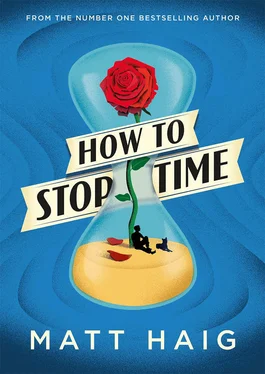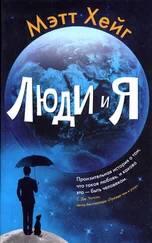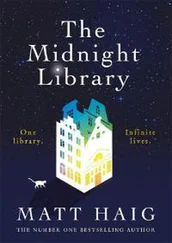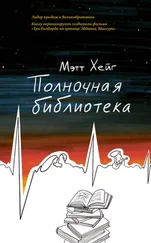Мэтт Хейг - How to Stop Time
Здесь есть возможность читать онлайн «Мэтт Хейг - How to Stop Time» весь текст электронной книги совершенно бесплатно (целиком полную версию без сокращений). В некоторых случаях можно слушать аудио, скачать через торрент в формате fb2 и присутствует краткое содержание. Год выпуска: 2017, Издательство: Canongate Books, Жанр: Современная проза, на английском языке. Описание произведения, (предисловие) а так же отзывы посетителей доступны на портале библиотеки ЛибКат.
- Название:How to Stop Time
- Автор:
- Издательство:Canongate Books
- Жанр:
- Год:2017
- ISBN:нет данных
- Рейтинг книги:4 / 5. Голосов: 2
-
Избранное:Добавить в избранное
- Отзывы:
-
Ваша оценка:
- 80
- 1
- 2
- 3
- 4
- 5
How to Stop Time: краткое содержание, описание и аннотация
Предлагаем к чтению аннотацию, описание, краткое содержание или предисловие (зависит от того, что написал сам автор книги «How to Stop Time»). Если вы не нашли необходимую информацию о книге — напишите в комментариях, мы постараемся отыскать её.
How to Stop Time — читать онлайн бесплатно полную книгу (весь текст) целиком
Ниже представлен текст книги, разбитый по страницам. Система сохранения места последней прочитанной страницы, позволяет с удобством читать онлайн бесплатно книгу «How to Stop Time», без необходимости каждый раз заново искать на чём Вы остановились. Поставьте закладку, и сможете в любой момент перейти на страницу, на которой закончили чтение.
Интервал:
Закладка:
He takes the menus, and their portraits of my former boss, and I turn back to look at Camille and try to relax.
‘I’m sorry,’ I say. ‘About being a bit odd sometimes, at school.’
Camille shakes her head. ‘You really have to stop saying that. Incessant apologising is never an attractive trait.’
‘You’re right. The thing is, I really am quite bad, you know, with people .’
‘Ah, them. People. Yes, it’s hard.’
‘And I have a lot, sometimes, going on in my head.’
‘Join the club.’
‘There’s a club?’
‘No. There are too many people in clubs. But it’s fine. Be how you want to be.’
‘I haven’t been a very public person. I have had to be careful.’ I am sure, looking at her, that I have never known her. In this life of familiar patterns and people she has the wonderfully rare feature of not reminding me of anyone . But I have to ask. ‘We never met, did we? I mean, before I saw you that day in the park. I saw you once, from Daphne’s window, but we have never met before , have we?’
‘It depends what you mean by met. But, no, in the conventional sense, no.’
‘Okay.’
‘Yeah.’
There is a kind of stand-off. We both have more questions but we are carrying them in holsters waiting for the other one to fire away. A single sentence could render either of us insane.
We nibble on rye bread and harpoon olives with cocktail sticks.
‘How are you feeling?’ I ask. The tamest enquiry, but a sincere one.
She rips some bread apart and stares at it for a moment, as if a secret is there, contained like every element in the universe, inside the leavened dough.
‘Much better,’ she says. ‘I’ve had epilepsy for a long time. Used to be a lot worse.’
A long time.
‘So you’ve had lots of seizures before?’
‘Yes,’ she says.
The waiter tops up our wine. I take a sip. Then another.
Camille looks at me with forceful eyes. ‘Now you. You promised. I need to know your story.’
‘I want to tell you about myself,’ I tell her, still unsure of how much truth I will eventually reveal. ‘But there are some things that it is better for you – for anyone – not to know.’
‘Criminal things?’ I feel like she is teasing me.
‘No. I mean, well, there are a few of those as well. No. I am just saying if you knew about me there would be a very strong chance you would think I was insane.’
‘Philip K. Dick wrote that it is sometimes an appropriate response to reality to go insane.’
‘The sci-fi writer?’
‘Yes. I’m a geek. I like science fiction.’
‘That’s good,’ I say.
‘You like it too?’
No . I am it , I think to myself.
‘Some. Frankenstein . Flowers for Algernon .’
‘I want you to tell me about yourself,’ she says. ‘Tell me, at least, what you were going to tell me. Let me know if I am mad.’
It is tempting, right then, to put an end to it by saying you are mad . But instead I say, ‘Before I tell you about me, you have to tell me about you.’ I sound firmer than I had intended.
Wide eyes. ‘Do I?’
I inhale deeply. This is the moment. ‘I need to know how you recognised me. I need to know why you mentioned Ciro’s. Ciro’s closed eighty years ago.’
‘I am not that old.’
‘Exactly. I didn’t think so.’
A song comes on in the background. She tilts her head. ‘Ah, I love this. Listen.’
I listen. A warm, sentimental melody I recognise. It’s ‘Coming Around Again’ by Carly Simon.
‘My mother used to love Carly Simon.’
‘And Michael Jackson?’
‘That was just me.’
She smiles, and there is a moment of awkwardness when she realises it is her turn to explain herself. And in that moment I imagine being with her. Like I had in the pub. I imagine kissing her. I have an urge to run away and to get Hendrich to book me a plane and to disappear somewhere else, somewhere I will never see her again. But it is too late.
She is ready.
‘Right,’ she says. ‘Je vais m’expliquer.’
And she does.
She tells me she started having seizures when she was seven. Her parents safe-proofed the house. Soft carpets. Table corners blunted by glued-on napkins. Finding the right medication had taken a while. And she slowly became agoraphobic. ‘I was scared of life, basically.’
When she was nineteen she’d become engaged to a handsome, funny web designer called Erik – ‘with a K’, his mother was Swedish. This was the Erik I’d seen online. Facebook Erik. He had died in 2011 while rock climbing.
‘I was there. Not climbing, obviously. Rock climbing and seizures don’t go that well. But I was there. I was with some of our friends. There was a lot of blood. I didn’t see anything for months when I closed my eyes except blood. And now he was dead I thought, well . . . fuck it.’
She takes a few breaths. To talk about memories is to live them a little.
‘I was always worrying I could die at any minute. And I wanted to be like him, healthy, but then – bam – he turned out to be mortal too. And it was too much. I had to get out of there. I had to get out, so I went travelling. I knew I couldn’t live as a prisoner to my condition any more. Do you understand?’
Of course I did. ‘So what happened after that? How did things turn around?’
‘I travelled around South America for six months. Brazil, Argentina, Bolivia, Columbia. Chile. I loved Chile. It was amazing. But then, eventually, my money ran out, and so I went back to France and I couldn’t go back to Grenoble – just the memories, you know – so I went to Paris. I went around all the nice restaurants and hotels and I got a job at the Plaza Athénée. One of the snooty grand hotels. There was something calming about that work. You would be speaking to people all the time, all day, checking in, checking out, but there was never anything deep and meaningful to it, you know? There were never any questions about life stuff, so it suited me perfectly.’
This is it. I sense it. Anxiety tightens my chest as she continues.
‘And anyway, they had these photos, this exhibition in the lobby, of Golden Age Paris, all from the twenties. And lots were of jazz clubs, and of the boulevards, and Montmartre, and they had one of what’s her name . . . the jazz singer, the dancer, with the cheetah . . .’
‘Josephine Baker?’
As I say the name I remember watching her through a mist of cigarette smoke dancing the Charleston at the Century Club in Paris.
She nods quickly, makes a rolling motion with her hands, as if she is nearing her conclusion. I try to steel myself.
‘Yes. Josephine Baker. Anyway, the one I was facing, the one I looked at, day in, day out, was the largest one: of the pianist at a restaurant. The restaurant was called Ciro’s. It had the name Ciro’s in the photograph. And the photo was black and white but very good quality for the time, and the man looked so lost in the music he was playing, as he looked forward over the piano, ignoring all the people in the restaurant who were looking at him, and I became fascinated by this moment, this frozen moment . . . Because it seemed like there was something timeless about it. Something beyond time. And also, the man was handsome. He had nice hands. And a seriously brooding face. And he had this pristine white shirt on, but with his sleeves rolled up, devil may care, and there was this scar on his arm. This curved scar. And I thought it was okay to have a crush on this man because he was dead. Only he wasn’t dead, was he? Because he was you.’
I hesitate. Suddenly I have no idea what to do. I remember her staring at the scar on my arm in the pub and now I know why. It all makes sense.
Читать дальшеИнтервал:
Закладка:
Похожие книги на «How to Stop Time»
Представляем Вашему вниманию похожие книги на «How to Stop Time» списком для выбора. Мы отобрали схожую по названию и смыслу литературу в надежде предоставить читателям больше вариантов отыскать новые, интересные, ещё непрочитанные произведения.
Обсуждение, отзывы о книге «How to Stop Time» и просто собственные мнения читателей. Оставьте ваши комментарии, напишите, что Вы думаете о произведении, его смысле или главных героях. Укажите что конкретно понравилось, а что нет, и почему Вы так считаете.

![Мэтт Хейг - Влюбиться в жизнь [Как научиться жить снова, когда ты почти уничтожен депрессией]](/books/28868/mett-hejg-vlyubitsya-v-zhizn-kak-nauchitsya-zhit-sn-thumb.webp)





![Мэтт Хейг - Полночная библиотека [litres]](/books/388474/mett-hejg-polnochnaya-biblioteka-litres-thumb.webp)

![Мэтт Хейг - Клуб призрачных отцов [litres]](/books/392121/mett-hejg-klub-prizrachnyh-otcov-litres-thumb.webp)

![Мэтт Хейг - Отец Рождество и Я [litres]](/books/421076/mett-hejg-otec-rozhdestvo-i-ya-litres-thumb.webp)
